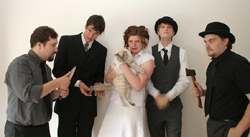The Scarring Party
by Dan Vierck
January 2008

Milwaukee's The Scarring Party
The Scarring Party could be the set up to a joke wherein a tuba, banjo and an accordion take the stage. They could be a Tenacious D, a Juiceboxxx or a Macho Man Randy Savage rap album, but they’re not. They are a bizarre exercise in the defiance of time. They are practitioners of parallelisms, administers of allegory and subtle masters of musicianship. They could soon be the undisputed new big thing of Wisconsin. For now though, they are simply Milwaukee’s two-year-old four piece, neo-vaudevillian folk-pop favorites.
“With all that stuff [we bring] on stage it’s almost like prop comedy, to some people” Daniel Bullock, songwriter of the group says, “and that’s why they look down their noses at it.” What’s clever banter on stage, becomes coffeehouse quips in, well, a coffeehouse with tuba player Isa Carini and percussionist Chris Roberts backing him up there too. “I think when you’re in an acoustic band,” Bullock continues, “the way you create tonal difference is by pulling out new instruments. There’s always more stuff that can make it different, you know? It’s never a matter of getting a new pedal or something, it’s always a matter of ‘Oh my god, now I’ve got to like, build this thing’ or ‘I’ve got to rub this instrument against that instrument to make this totally different sound.’ People think it’s novelty, but really it’s just…”
“I think people get into it too, the instrumentation” percussionist Chris Roberts adds. “They’ll be like, ‘Wow, there’s a tuba on stage’, maybe I’ll watch this band. Not just like a typical rock band.” Indeed, typical rock band they are not.
Their formal attire aside, and even disregarding for now their turn-of-last-century sound, The Scarring Party proved on their debut, A Concise Introduction and again with follow up Come Away from the Light that they can smoothly produce toe-tapping pop numbers and denser, more intellectually rewarding compositions in the same copper mic’d hiss.
“I think, thematically, it’s a darker record,” Bullock explains, straightening his tie for the one thing he’s conversationally half serious about. “But it doesn’t sound quite as basic and it’s not as rough, so it might not seem darker as opposed to, people who are listening to it more for sound or, lyrics or, reading into the… I don’t know how people listen to records now. I only know how I listen to records so it’s hard to say.”
“It’s a lot more arranged but I feel like a lot of the tracks in the beginning are bouncy-er or a little bit easier to digest” Carini says. “As it goes on, not to say that it gets less easy to digest as it goes, I mean, it takes on a different kind of feel later. It just leaves you, in a very different mood at the end.”
The album does pace itself, never leaning too heavily in one direction for very long. The first three songs prove a nice warm up, stretching toward the extremes the quartet can hit, from the religious implications and sonic dynamics of “Revelator” to spot on, standard dark humor in the rollicking “Flat”.Tuba and percussion-lead “Leslie Ann Marrimac” comes fourth, taking the listener chin deep into the group’s breezy storytelling capabilities. The album only hits these extremes harder later on. “See Evil” is thus far the pinnacle of the group’s pop sensibility, stylistic innovation and bitter sarcasm rolled into one. On the other end of the spectrum, the seven minute “Everything I Touched Caught Fire”, a sparsely arranged epic of a stumbling vignette easily earns the honor of standout track. Focusing on a jobless, frustrated young man, the tale is characteristically as outdated as much as it is relevant.
“I think when you write in terms of characters, any kind of narratives that tell a story, you’re getting a lot closer to telling the truth” Bullock says. “I think it makes fiction interesting, but life more interesting, that fiction has an arc that ends with a change. The songs that we write, we’re telling a small vignette. And most of the time in those stories, the character doesn’t actually change. It’s more about the intent to change and seeing how that manifests. ‘Cause we only have three minutes, or a minute and forty seconds. That’s not enough time to turn a shitty life around.”
The album, running thirty three minutes, sets the band up a step forward and to the left of their more bizarre, shakier debut. Including three re-workings of previously released songs, Come Away from the Light is a bit streamlined, a little more focused musically and undeniably tighter thematically. Having already opened for The Ditty Bops in Milwaukee and Madison, played with Tilly and the Wall at Milwaukee’s elegant Pabst Theatre and opened Cake’s New Year’s party in 2007 their future pleasantly contrasts with the new album’s shadowy title.
Bullock still has his goals for the band. “I was watching BET once and Mary J Blige was on and she was saying that she felt the next logical step in her career was to have her own clothing line. That’s where we’re headed.”
(6063) Page Views Scarring Party Online: